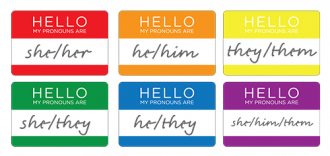
(Posted 2022 May)
 Pronouns--Why Do They Matter?
Pronouns--Why Do They Matter?
Language matters. Language is a tool that helps us convey meaning and connect. We use words to communicate, characterize, and describe everything around us. Nothing may be more personal than the words people use to refer to us through our names and pronouns, which represent key elements of our identity.
We use pronouns and names frequently in our everyday written and verbal communication. Most of us have learned from a young age to use “she/her” for girls and “he/him” for boys. As our society has progressed in understanding gender identity, our language has also evolved.
A few years ago, I remember participating in a training and receiving guidance about how we should approach the use of pronouns. The first recommendation was asking clients, “What is your preferred pronoun?” Recently, I have learned this question is problematic because a person’s pronouns are not just “preferred;” they are the pronouns that should be used. We might ask clients instead, “What are your pronouns?” Properly using an individual's correct pronoun is an easy way to show respect.
We can model the use of pronouns by adding our pronouns to signatures and virtual meeting profiles, sharing our pronouns whenever we introduce ourselves, and asking people their pronouns as well as correctly identifying them. When we disclose our pronouns we send the message, “You are safe here.” For example, after an ADAPT staff member consistently shared their pronouns in sessions, they noticed clients also began sharing their pronouns and became more open about discussing their relationships.
In an instance where a pronoun is unknown or not indicated, gender-neutral pronouns provide a useful option. In September 2019, Merriam-Webster dictionary added another definition to the word “they” to explain the word’s use as a singular pronoun as, “used to refer to a single person whose gender identity is non-binary.” This addition indicates an important milestone in recognizing that gender does not have to conform to the rigid binary of male and female. People who identify as nonbinary often use gender-neutral pronouns like they, them, and theirs1.
In the work we do, we hear the word “safety” mentioned several times a day. We think about safety when we are talking with someone who has been victimized or someone who has caused harm themselves. Using the correct pronouns promotes equity and helps our clients know they matter, are safe to be themselves, and are respected regardless of the reason they are connecting with Domestic and Sexual Violence Services.
Below is a list of resources about gender identity and pronouns to learn even more:
• What Are Pronouns? Why Do They Matter?
• Pronouns Usage Among LGBTQ Youth
• Gender Pronouns
• What are Gender Pronouns? Why Do They Matter?
Andréa Nunes-Gardner is an ADAPT supervisor and DSVS equity advocate.
1 Sutori. (September, 2019). Did you know? Merriam-Webster adds ‘they’ as a singular pronoun. Retrieved from Pronouns: Why Do They Matter? | Sutori
This article posting is part of the Domestic and Sexual Violence Services' Volunteer Voices monthly newsletter for current and potential volunteers. If you're not already a volunteer, learn how to get involved. Find out about upcoming trainings, volunteer trainings, happenings around the DSVS office and information about articles, books, media recommendations and more.
Learn more about the Domestic and Sexual Violence Services (DSVS).

